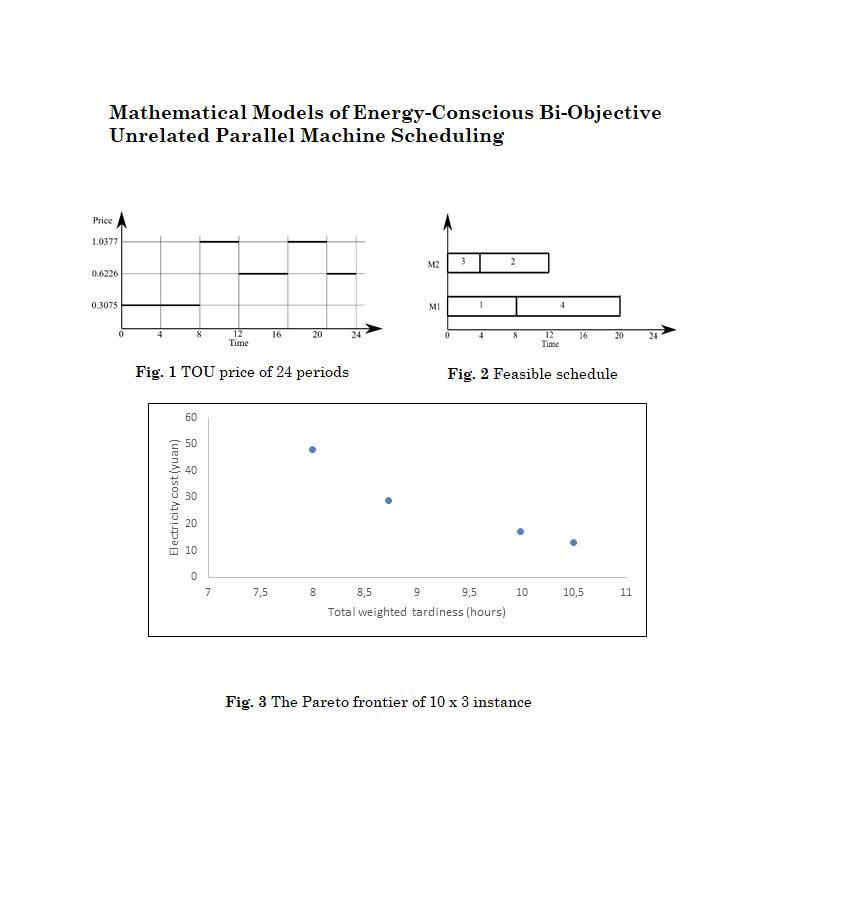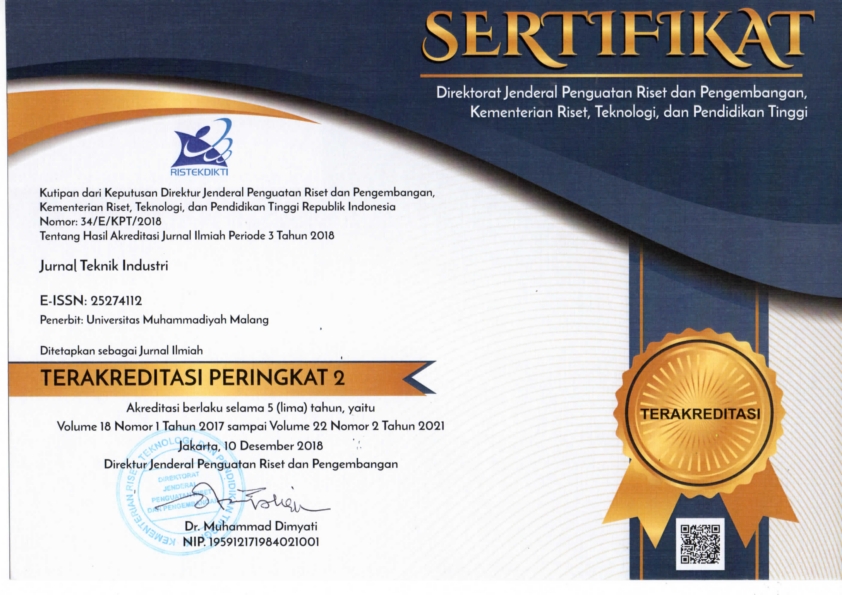Mathematical Models of Energy-Conscious Bi-Objective Unrelated Parallel Machine Scheduling
DOI:
https://doi.org/10.22219/JTIUMM.Vol21.No2.115-125Keywords:
Bi-objective, Unrelated parallel machine, Weighted sum method, Time-of-use (TOU) tariffs schedulingAbstract
The industrialization has led to the prosperity of human life. However, it causes the side effect that harms the environment. Moreover, the source of energy used to drive the industrialization comes from non-renewable resources that can be extinct. As the extensive energy user, the manufacturing sector can use energy efficiently by scheduling and planning. A scheduling system that incorporates environmental and the energy consumption is one of the initiatives to reduce energy consumption and reduce environmental effects. Therefore, this study addresses bi-objective unrelated parallel machine scheduling to minimize the total tardiness and energy consumption. The energy consumption follows the Time-Of-Use (TOU) tariffs price scheme. The problem is formulated as two mixed-integer programming (MIP) models, using the time-indexed and disjunctive formulation, and solved using the weighted sum method. We perform complexity and computational analysis to evaluate the performance of models. Numerical experiments show that the time-indexed formulation is more efficient than the disjunctive formulation. The results provide useful insights for decision-makers in the manufacturing sectors to be energy-conscious without neglecting the production efficiency.
Downloads
References
R. Zhang and R. Chiong, "Solving the energy-efficient job shop scheduling problem: a multi-objective genetic algorithm with enhanced local search for minimizing the total weighted tardiness and total energy consumption," Journal of Cleaner Production, vol. 112, pp. 3361-3375, 2016. https://doi.org/10.1016/j.jclepro.2015.09.097.
K. Constant, C. Nourry, and T. Seegmuller, "Population growth in polluting industrialization," Resource and Energy Economics, vol. 36, pp. 229-247, 2014. https://dx.doi.org/10.1016/j.reseneeco.2013.05.004.
S. Okajima and H. Okajima, "Analysis of energy intensity in Japan," Energy Policy, vol. 61, pp. 574-586, 2013. https://dx.doi.org/10.1016/j.enpol.2013.05.117.
M. Mori, M. Fujishima, Y. Inamasu, and Y. Oda, "A study on energy efficiency improvement for machine tools," CIRP Annals, vol. 60, pp. 145-148, 2011. https://dx.doi.org/10.1016/j.cirp.2011.03.099.
G. Y. Zhao, Z. Y. Liu, Y. He, H. J. Cao, and Y. B. Guo, "Energy consumption in machining: Classification, prediction, and reduction strategy," Energy, vol. 133, pp. 142-157, 2017. https://dx.doi.org/10.1016/j.energy.2017.05.110.
G. Mouzon and M. B. Yildirim, "A framework to minimise total energy consumption and total tardiness on a single machine," International Journal of Sustainable Engineering, vol. 1, pp. 105-116, 2008. https://dx.doi.org/10.1080/19397030802257236.
K. Gao, Y. Huang, A. Sadollah, and L. Wang, "A review of energy-efficient scheduling in intelligent production systems," Complex & Intelligent Systems, vol. 6, pp. 237-249, 2020. https://dx.doi.org/10.1007/s40747-019-00122-6.
G. Mouzon, M. B. Yildirim, and J. Twomey, "Operational methods for minimization of energy consumption of manufacturing equipment," International Journal of Production Research, vol. 45, pp. 4247-4271, 2007. https://dx.doi.org/10.1080/00207540701450013.
D. Tang and M. Dai, "Energy-efficient approach to minimizing the energy consumption in an extended job-shop scheduling problem," Chinese Journal of Mechanical Engineering, vol. 28, pp. 1048-1055, 2015. https://dx.doi.org/10.3901/CJME.2015.0617.082.
D. M. Utama, "An Effective Hybrid Sine Cosine Algorithm to Minimize Carbon Emission on Flow-shop Scheduling Sequence Dependent Setup," 2019, vol. 20, p. 11, 2019. https://dx.doi.org/10.22219/JTIUMM.Vol20.No1.62-72.
K. Fang, N. A. Uhan, F. Zhao, and J. W. Sutherland, "Scheduling on a single machine under time-of-use electricity tariffs," Annals of Operations Research, vol. 238, pp. 199-227, 2016. https://dx.doi.org/10.1007/s10479-015-2003-5.
B. Kurniawan, A. A. Gozali, W. Weng, and S. Fujimura, "A genetic algorithm for unrelated parallel machine scheduling minimizing makespan cost and electricity cost under time-of-use (TOU) tariffs with job delay mechanism," in 2017 IEEE International Conference on Industrial Engineering and Engineering Management (IEEM), 2017, pp. 583-587. https://dx.doi.org/10.1109/IEEM.2017.8289958.
S. Rubaiee, S. Cinar, and M. B. Yildirim, "An Energy-Aware Multiobjective Optimization Framework to Minimize Total Tardiness and Energy Cost on a Single-Machine Nonpreemptive Scheduling," IEEE Transactions on Engineering Management, vol. 66, pp. 699-714, 2019. https://dx.doi.org/10.1109/TEM.2018.2846627.
B. Kurniawan, A. A. Gozali, W. Weng, and S. Fujimura, "A Mix Integer Programming Model for Bi-objective Single Machine with Total Weighted Tardiness and Electricity Cost under Time-of-use Tariffs," in 2018 IEEE International Conference on Industrial Engineering and Engineering Management (IEEM), 2018, pp. 137-141. https://dx.doi.org/10.1109/IEEM.2018.8607420.
W. Chandramitasari, B. Kurniawan, and S. Fujimura, "Building Deep Neural Network Model for Short Term Electricity Consumption Forecasting," in 2018 International Symposium on Advanced Intelligent Informatics (SAIN), 2018, pp. 43-48. https://dx.doi.org/10.1109/SAIN.2018.8673340.
M. B. Yildirim and G. Mouzon, "Single-Machine Sustainable Production Planning to Minimize Total Energy Consumption and Total Completion Time Using a Multiple Objective Genetic Algorithm," IEEE Transactions on Engineering Management, vol. 59, pp. 585-597, 2012. https://dx.doi.org/10.1109/TEM.2011.2171055.
J.-Y. Moon, K. Shin, and J. Park, "Optimization of production scheduling with time-dependent and machine-dependent electricity cost for industrial energy efficiency," The International Journal of Advanced Manufacturing Technology, vol. 68, pp. 523-535, 2013. https://dx.doi.org/10.1007/s00170-013-4749-8.
J. Koo and B.-I. Kim, "Some comments on “Optimization of production scheduling with time-dependent and machine-dependent electricity cost for industrial energy efficiency”," The International Journal of Advanced Manufacturing Technology, vol. 86, pp. 2803-2806, 2016. https://dx.doi.org/10.1007/s00170-016-8375-0.
B. Kurniawan, W. Chandramitasari, A. A. Gozali, W. Weng, and S. Fujimura, "Triple-chromosome genetic algorithm for unrelated parallel machine scheduling under time-of-use tariffs," IEEJ Transactions on Electrical and Electronic Engineering, vol. 15, pp. 208-217, 2020. https://dx.doi.org/10.1002/tee.23047.
J. Ding, S. Song, R. Zhang, R. Chiong, and C. Wu, "Parallel Machine Scheduling Under Time-of-Use Electricity Prices: New Models and Optimization Approaches," IEEE Transactions on Automation Science and Engineering, vol. 13, pp. 1138-1154, 2016. https://dx.doi.org/10.1109/TASE.2015.2495328.
H. Saberi-Aliabad, M. Reisi-Nafchi, and G. Moslehi, "Energy-efficient scheduling in an unrelated parallel-machine environment under time-of-use electricity tariffs," Journal of Cleaner Production, vol. 249, p. 119393, 2020. https://dx.doi.org/10.1016/j.jclepro.2019.119393.
M. S. Nikabadi and R. Naderi, "A hybrid algorithm for unrelated parallel machines scheduling," International Journal of Industrial Engineering Computations, vol. 7, pp. 681-702, 2016. https://dx.doi.org/10.5267/J.IJIEC.2016.2.004.
Z. Li, H. Yang, S. Zhang, and G. Liu, "Unrelated parallel machine scheduling problem with energy and tardiness cost," The International Journal of Advanced Manufacturing Technology, vol. 84, pp. 213-226, 2016. https://dx.doi.org/10.1007/s00170-015-7657-2.
W. Zhu and L. Tianyu, "A Novel Multi-Objective Scheduling Method for Energy Based Unrelated Parallel Machines With Auxiliary Resource Constraints," IEEE Access, vol. 7, pp. 168688-168699, 2019. https://dx.doi.org/10.1109/ACCESS.2019.2954601.
E. H. Bowman, "The Schedule-Sequencing Problem," Operations Research, vol. 7, pp. 621-624, 1959. https://dx.doi.org/10.2307/167010.
A. S. Manne, "On the Job-Shop Scheduling Problem," Operations Research, vol. 8, pp. 219-223, 1960. https://dx.doi.org/10.2307/167204.
K. Deb, A. Pratap, S. Agarwal, and T. Meyarivan, "A fast and elitist multi-objective genetic algorithm: NSGA-II," IEEE Transactions on Evolutionary Computation, vol. 6, pp. 182-197, 2002. https://dx.doi.org/10.1109/4235.996017.
Q. Zhang and H. Li, "MOEA/D: A Multi-objective Evolutionary Algorithm Based on Decomposition," IEEE Transactions on Evolutionary Computation, vol. 11, pp. 712-731, 2007. https://dx.doi.org/10.1109/TEVC.2007.892759.
R. Wang, Z. Zhou, H. Ishibuchi, T. Liao, and T. Zhang, "Localized Weighted Sum Method for Many-Objective Optimization," IEEE Transactions on Evolutionary Computation, vol. 22, pp. 3-18, 2018. https://dx.doi.org/10.1109/TEVC.2016.2611642.
R. T. Marler and J. S. Arora, "The weighted sum method for multi-objective optimization: new insights," Structural and Multidisciplinary Optimization, vol. 41, pp. 853-862, 2010. https://dx.doi.org/10.1007/s00158-009-0460-7.
S. M. Khoiroh, "Pengembangan Algoritma Non Delay Pada Kasus Penjadwalan Non-Permutation Hybrid Flowshop Untuk Minimasi Mean Flowtime," 2018, vol. 19, p. 9, 2018. https://dx.doi.org/10.22219/JTIUMM.Vol19.No2.148-156.
B. Kurniawan, W. Song, W. Weng, and S. Fujimura, "Distributed-elite local search based on a genetic algorithm for bi-objective job-shop scheduling under time-of-use tariffs," Evolutionary Intelligence, 2020. https://dx.doi.org/10.1007/s12065-020-00426-4.

Downloads
Published
How to Cite
Issue
Section
License
Copyright (c) 2020 Bobby Kurniawan

This work is licensed under a Creative Commons Attribution-ShareAlike 4.0 International License.











